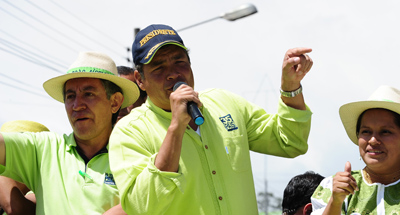One result of President Rafael Correa’s high-profile campaign to demonize the country’s private media can be seen on the desk of José Velásquez, news manager at Teleamazonas, a private Quito television station often critical of the government. Among the documents piled high on his desk are lawsuits, which used to be a rare thing. Encouraged by Correa, who has personally sued newspapers and journalists, Velásquez says, the subjects of Teleamazonas news reports are now filing between two and five lawsuits per month against the station.
In this series
• Part 1: Repression deepens
• Part 2: Breakfast bulletin
• Part 3: Election without news
• Part 4: Four more years
“Because the president is so aggressive with journalists, it empowers a lot of people,” Velásquez says. “Correa says we are incompetent and corrupt. So, now the average Joe in the street says: ‘Yeah, yeah, yeah, you are corrupt so I am going to sue you too.'”
Critics say that in the absence of a strong political opposition, Correa, who is heavily favored to win another four-year term in the February 17 election, has turned the Ecuadoran press into his whipping boy. In speeches, Correa vilifies the news media as “liars” out to sabotage his “citizen’s revolution.” Along with the lawsuits filed by the president, his government has enacted laws that suppress political speech. Government ministers refuse to speak to critical private media. Regulators have shut community radio stations that did not support the administration. And some reporters have been subjected to a seemingly organized barrage of insults via Twitter.
All of this appears to have emboldened some members of the public to confront the media in a variety of ways, from legal harassment to physical attacks, Cesar Ricaurte, director of the Ecuadoran press freedom group Fundamedios, told CPJ. In 2012, Fundamedios documented 173 acts of aggression against Ecuadoran journalists, up from just 22 in 2008. These acts included the first killing since 2005 of an Ecuadoran reporter for reasons related to his work, as well as 13 assaults and 15 threats.
“This is the consequence of political polarization: It makes people see the world in black and white, and that’s why the risks for journalists are on the rise,” Ricaurte said. “Correa is very popular and if you are a fan of the president you are expected to hate the press.”
Indeed, the streets of Quito are full of press critics. When asked about Correa’s attitude toward the media, taxi driver Mario Cualchi, told CPJ he agreed with the president. “I’ve known for years that the media rarely tells the truth,” he said.
Juan Carlos Calderón, the editor of the weekly Vanguardia newsmagazine and one of the journalists who was sued by the president, said that some of his pro-government relatives now give him a hard time about his critical reporting on the Correa administration.
Another magazine editor, who did not want to be identified, said that the criticism comes from both sides. People who support the president ask why the media is so corrupt, the editor said, while opponents accuse reporters of backing down amid the government’s campaign against the press.
One reporter who has stepped away from hard-hitting investigations of the Correa government is Janet Hinostroza, the former host of Teleamazonas’ program “La Mañana 24 horas.” In September, Hinostroza received phone calls from an unidentified person who threatened to kidnap her young son. The threats prompted her to postpone broadcast of the last segment of a three-part investigation on Pedro Delgado, a cousin of the president who was then president of the Central Bank (and who has followed Correa’s example of suing journalists). She left the program but continues to present a lighter news magazine program on Teleamazonas on Saturdays.
As evidence of public support, Hinostroza said she received “thousands of messages” urging her to come back to the morning program. But she said investigating government corruption put her family at risk. Even today, she said, she is still subjected to abusive comments on Twitter and harsh criticism from government officials.
To sum up the government’s media strategy, she referred to an article last year in the Mexican magazine Gatopardo. In it Fernando Alvarado, Ecuador’s secretary of communications, referred to the press as “weeds” that must be regularly cut. (Alvarado is now on leave.)
In an interview with CPJ, Patricio Barriga, acting secretary of communications, denied that the Correa government was trying to turn the public against the private media. He said reporters are losing the public relations battle with Correa and in response they are trying to turn the conflict into a press freedom issue. “To me, all this talk of hostility against the media is a thesis promoted by some members of the press,” Barriga said. “It is in their interest to maintain a level of conflict. They want confrontation.”
Reporters say it’s Correa who is picking the fight because he is thin-skinned and no longer faces any solid political opposition. Most pre-election polls show Correa with a double-digit lead and project he will win in the first round of voting.
During one of his last televised town-hall meetings before taking a break during the presidential campaign, Correa again lashed out at the media for its coverage of his cousin, Delgado. “Look what I’m going to do,” Correa said at the November 24 event as he held up a critical story about Delgado in the Guayaquil daily El Universo. Then, to the cheers of the crowd, a grinning Correa ripped the newspaper in half.
But it turns out the press had it right.
As president of the Central Bank, Delgado had attracted massive media attention over an allegedly improper bank loan as well as his acquisition of a house in Miami through a loan. On December 19, Delgado resigned after admitting he had falsified his academic degree. He then fled the country.
[Reporting from Quito, Ecuador]
